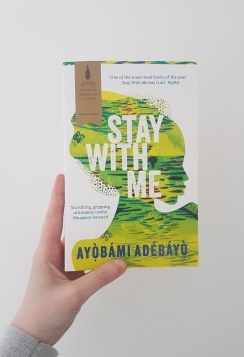5/5 stars!
Stay With Me is one of the most moving novels I’ve probably ever read. A vibrant cast of characters, with their distinctive voices and complicated ideals, bring this Yoruba community in Nigeria to life. This is going to be a long review: I’ll do my best to avoid proper spoilers, but some small ones may filter through. I have many thoughts!
The premise:
Yejide and Akin met and fell in love at university, and have always agreed that polygamy is not for them, in spite of the cultural expectations of their Yoruba community in Ilesa, Nigeria.
However, four years into their marriage–after consulting fertility doctors and healers, trying strange teas and unlikely cures–Yejide is still not pregnant. She’s not worried, as she and Akin are still so young. That is, until relatives arrive on her doorstep to introduce the couple to a young woman they have appointed as Akin’s second wife.
Now Yejide knows that she can only save her marriage by bearing a child. Eventually, she achieves this, but at what cost?

My Review:
Where to begin?
This novel is so electrifying, so emotionally charged, it takes your breath away.
The opening chapter, through Yejide’s narration, sets up the narrative of marital breakdown, child loss, and grief. She is addressing her husband, as she prepares to leave the life she has built for herself and return to him.
“The road stretches before us, shrouded in a darkness transitioning into dawn as it leads me back to you.”
Such is the prose that Adébáyọ̀’s novel is composed of – beautiful, lyrical, and vivid. The above quote that concludes the opening chapter elicits a sense of movement, a cautiously hopeful anticipation of what’s to come.
We are then taken back in time, to discover the cause of their separation. Immediately, we are thrust into the conflict that Yejide and Akin face: the overwhelming expectation for them to conceive a child, and the pressures of their community to adhere to polygamy. It was enlightening to see how ingrained such traditions are into cultural identities, into the language of families.
“I shuddered when Iya Martha referred to me as Fumni’s iyale. The word crackled in my ears, iyale – first wife. It was a verdict that marked me as not woman enough for my husband.”
Allowing Akin to take another wife horrifies Yejide because, from her point of view, it will diminish their love, their vows to each other, and will cast judgement on her own status as a wife and a woman. For Yejide, as with women across countries and cultures, her existence as a woman and a wife is tied up with motherhood. Her body is something she should have control over, but it fails her, time and again. In her anguish, she travels to “the Mountain of Jaw Dropping Miracles”, where she is told that to achieve fertility, she must breastfeed a goat while dancing within a circle of bearded men.

Throughout the novel’s proceedings, Yejide and Akin are faced with challenges that test their individual and shared beliefs, their loyalty to each other, to their culture, and to themselves. In spite of being on the same page about many aspects of marital life, there are still moments when both Akin and Yejide will revert to patriarchal norms. Akin, buckling under the weight of his own insecurities, lashes out in a rage, resorts to an unthinkable act, yet Yejide prepares his breakfast for him as usual. These ‘self vs tradition’ dilemmas often manifest as ‘spouse vs parent’ conflicts, a divide between generations. Those are the stakes, because whether one rebels or yields to tradition, inevitably, someone will be hurt. So how do you choose?
What’s so powerful about Adébáyọ̀’s plot is how simultaneously intricate and chaotic it is. Decisions and sacrifices are made by Yejide, Akin, and their extended family to produce a much-wanted child (wanted by so many for a number of reasons. Even if we know those decisions will have terrible consequences; even if we disagree with the reasoning for the decision; the way it was reached by each character makes sense. This was so important for my own reading experience because I felt completely immersed in these characters’ lives, feelings, and motivations.
Each character displayed a resilience unique to them, hard-won from their experiences. From Yejide’s headstrong outspokenness, to Akin’s quiet determination to make his wife happy, to the refusal of Moomi, Akin’s mother, to place another’s feelings before her desire for a grandchild. While there was some focus on the indomitable female spirit being assailed by manifestations of male pride, the balance was finely struck in presenting the indiscriminate damage that such gendered identities cause. Men and women alike were driven to extremes under the weight of expectation placed upon them.
While this intense exploration of marriage and parenthood drives most of the novel, Adébáyọ̀ never misses an opportunity to demonstrate the vibrant humour – intentional or not – in her characters and their culture. It shows most evidently in the dialogue – the colourful wars of words that make up everyday talk. Even the mountain scene with the goat strikes a balance between tragedy and comedy as it exclaims: This is what Yejide has been driven to!

I genuinely couldn’t find fault with Stay With Me, even if I had wanted to. Everything – the plot, the characters, the tone, the prose – was intricately crafted, making this a joy to read even as the intensity of the story increased. The emotional stakes were high in this novel, making it impossible to turn away once I’d started. The cultural setting was portrayed with vividness that teased out its complexities with tenderness, humour, and occasionally concern. The beauty of Nigerian culture was compassionately juxtaposed with the personal traumas that can result from certain traditions.
Adébáyọ̀ has created a real masterpiece with her debut novel: I felt every beat of the story, of each character’s journey, keenly. As heart-wrenching as it could be, I couldn’t tear myself away from this book. That’s kind of what I want in a book: stories and characters that I’m emotionally invested in.
The title of this novel could not summarise its theme or its effect better: it will Stay With Me for a long time!
Thank you for reading my (incredibly long) review!
————————–
*Stay With Me, written by Ayọ̀bámi Adébáyọ̀, is published by Canongate Books.
